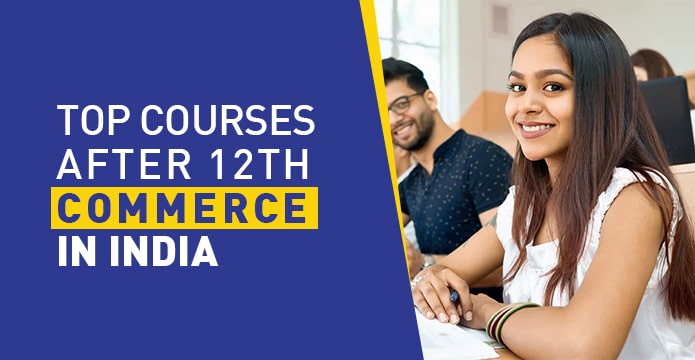Commerce is reportedly the most opted stream by Indian students after class 10. The stream deals with the study of finance, trade, business along with the study of relationship between a producer and a consumer and the exchange of goods and services between them. This is a very vast stream dealing with all things finance and trading, which opens lucrative career opportunities after 12th. Commerce students can delve deeper into individual fields and subjects like Economics, Accountancy and Business Studies etc. once they realise their field of interest. The possibilities are endless and opportunities are only golden. Let’s check out some of the courses and degree programmes commerce students can take after class 12 in India.
Main-stream Courses After Class 12 Commerce
Bachelors of Commerce (B.Com)
Bachelors of Commerce most commonly known as B.Com is the most preferred course for commerce students after completion of class 12. It is a three year course which gives students an in-depth understanding of the field of commerce. After B.Com students get a better idea of what their specialization should be. They can further specialize in economics, management studies, computer applications, foreign trade management, taxation, accountancy, e-commerce, banking, etc.
B.Com syllabus is filled with subjects such as Financial Accounting, Economics (Micro & Macro), Business Mathematics and Statistics, Income Tax among many others. But apart from these subjects students also need to choose other elective subjects from the ones offered by the university. Other additional subjects mainly include English, Environmental Science, Business Organization and Management etc.
Admission in Bachelors of Commerce varies from college to college and university to university. The basic requirement for admission in B.Com is Class 12 pass from a recognised board in Commerce stream with a minimum of 45% percentile. Some reputed universities have set their eligibility criteria on merit basis and only the top scorers ranging from 95%-99% percentile are accepted. Some colleges and Universities even conduct an entrance exam such as Banaras Hindu University – Undergraduate Entrance Test (BHU UET), Guru Gobind Singh Indraprastha University Common Entrance Test (IPU CET), NMIMS NPAT etc. Another criteria that varies is that some colleges & universities require candidates to have mathematics as a compulsory subject in class 12.
Bachelors of Commerce (Honours) or B.com (Hons)
Bachelors of Commerce (Honours) is a course similar to Bachelor of Commerce (which is termed as a General course) but more extensive. The fundamentals of the course are the same as that of B.Com but with an in-depth focus on specialization in a particular subject. It is a more Business oriented course unlike B.Com (General) which just focuses on introduction of the fields of commerce. It is also a three year regular course.
B.Com Honours also covers subjects like Financial Accounting, Economics (Micro & Macro), Business Mathematics and Statistics, Income Tax and additional subjects english and environmental science. In Honours though, students need to pick a specialization in their final year from subjects such as accounting or economics. Admission Criteria is the same as B.Com along with clearing the entrance examination of colleges and universities.
Bachelors in Economics
Bachelors in Economics is popularly known as Bachelor of Arts in Economics (BA Economics). This is a degree programme totally dedicated to study in Economics and is pretty popular among commerce students. It is the most preferred course after B.Com and B.Com (H). This programme gives a thorough understanding of production of resources (financial and non-financial), how these resources are conserved, used & distributed systematically, how funds are assigned in accordance with the socio-economic policies and to provide the best and substantial economic solutions to the society. This is a three year regular degree programme.
Students who have cleared class 12 from a recognized board in any stream with a minimum 50% percentile are eligible to apply for this programme. Though students from all streams can apply, Arts and Commerce students may be preferred because of the fact that they have studied economics as a main subject in 11th and 12th standard. Some colleges and universities accept admission applications on merit basis and may even conduct entrance exams.
Bachelors of Business Administration (BBA)
Popularly called as BBA, Bachelors of Business Administration is an undergraduate programme which gives students an understanding of the business administration. The programme helps students develop entrepreneurial skills and business managerial skills. From team work, communication skills, time management, problem solving and analytical skills everything is taught in BBA.
Some of the subjects covered in BBA are Business Law, Human Resource Management, Financial Accounting, Taxation, Business Environment, Research Methodology, Public Relations Management, Economics etc.
Eligibility for admission varies according to the college and university rules. A candidate needs to have cleared class 12 from any recognized board with a minimum aggregate of 50% percentile. Some of the colleges may also need the candidates to take an entrance exam.
Bachelor of Management Studies (BMS)
Bachelor of Management Studies is a degree programme similar to BBA but with an in depth focus on Human Resource Management, Business Studies and Economics. A field of study that equips students with all the know-hows of business management and skills that are required for efficiently running a business.
From business management to entrepreneurship, trading, stocks and finance BMS students are taught everything business related. Some of the subjects covered include Business Statistics, Business Law, Tax, Management Accounting, Financial Accounts, Computer Applications in Business, International Finance etc.
A candidate wanting to get an admission in BMS must have passed class 12 from a recognized board with a minimum aggregate of 50% percentile. But it is to be noted that the aggregate percentage varies from college to college and university to university. Some colleges have direct admissions while others make the candidates take an entrance exam.
Professional Courses After Class 12 Commerce
Chartered Accountancy (CA)
Chartered Accountancy is one of the most popular professional courses in India. A lot of aspirants dedicate themselves to prepare for the famed Chartered Accountancy Exam. Success in this examination leads to being a Chartered Accountant, one of the most reputed and highest paying jobs in India. Chartered Accountant means a certified accounting professional who is qualified to take care of affairs related to taxation and accounting of a business.
As reputed as this designation is, the course is equally tough which requires extensive preparation and dedication. The aspirants need to go through three levels of training which are designed by the Institute of Chartered Accountants of India (ICAI, a statutory body responsible for regulating and maintaining the profession of chartered accountancy in India). The three levels are CPT (Common Proficiency Test), IPCC (Integrated Professional Competence Course) and FC (Final Course).
CA aspirants need to have secured an aggregate of 50% (commerce stream, for other streams 55% aggregate without mathematics and 60% with mathematics) in class 12 to appear for the Common Proficiency Test. Only those who score at least 100 out of 200 marks in CPT are eligible for IPCC. There are 7 courses in IPCC, to clear the course candidates need to secure an aggregate of 50%. After clearing the IPCC, aspirants need to go for an internship of three years under a certified CA. The candidates then are eligible to take Final Course examination during the last three months of their internship. Passing this examination will lead to them being awarded the designation of a Chartered Accountant
Company Secretary (CS)
Company Secretary is another sought after professional course by commerce students, but students from any other field can go after this. This course also needs a lot of investment of time and dedication as the result is worthwhile. The Company Secretary course is a distance learning course offered by the Institute of Company Secretaries of India (ICSI), which was started to regulate the profession of Company Secretary.
This extensive course is of three year which covers subjects such as Financial Accounting, Economics and Statistics, Tax Laws, Financial, Treasury and Forex Management among other modules. After completion of the three year course, candidates also need to go through various training for the next two years.
Company Secretary aspirants can apply directly after passing out class 12 or after graduation. If a candidate wishes to apply after class 12, they have to crack the CS foundation exam after which they can get into the foundation programme. As for graduates, they can directly apply for executive programme by cracking the executive exam. After the candidates pass these exams they have to appear in a final exam, professional exam. Success in which means admission at the Institute of Company Secretaries of India.
Cost and Management Accountant (CMA)
CMA is a great professional course for those who want to thrive in the field of management accountancy. After CA and CS this is the most preferred professional course taken up by commerce students, it is getting more popular day by day. The course is offered by The Institute of Cost Accountants of India and focuses mainly on valuation issues, working capital policies, financial statement analysis etc.
Some of the subjects covered in this course are Business Mathematics and Statistic, Economics and Management, Company Accounts & Audit, Laws, Ethics and Governance, Taxation, Financial Analysis & Business Valuation, Corporate Laws and Compliance etc.
There are three levels to a CMA course, Level 1 – CMA Foundation Level, level 2 – CMA Intermediate Level and level 3 – CMA Final Level. The duration of CMA course is flexible and totally depends on a candidate’s dedication and level of focus. In India a student typically takes 3-4 years to complete a CMA course. CMA aspirants can take the CMA foundation level exam after passing class 12th from a recognised board. Once clearing the exam you can go for the intermediate level, after which you will be eligible for level 3 – CMA Final Level.
Certified Financial Planner (CFP)
CFP is an internationally recognized certification course on financial planning. A CFP professional advises individuals while making financial decisions to achieve their financial goals and life goals in general. There are six modules with five examinations in this certification programme mainly in disciplines like Risk Analysis & Insurance Planning, Advance Financial Planning, Investment Planning etc. In India CFP is regulated by the Financial Planning Standards Board (FPSB), they conduct CFP exams and certify.
To apply for a CFP course one needs to have passed class 12 from a recognised board, admission is based on merit (scores obtained in class 12 board). Someone who has cleared CA, CS exams and has done LLB, Ph.D may be preferred. Depending on the candidate’s eligibility and qualification the certification can be taken in two ways, Regular Pathway and Challenge Status Pathway.
Bachelor of Law (LLB)
Bachelor of Law is a three year postgraduate degree and among some of the most sought after professional courses in India. As the name suggests this programme focuses on various fields of law and it’s practice. From Criminal Law to labour law, family law, contractual law and legal writing LLB covers it all. Apart from these it also thoroughly covers constitutional law discussing its various sections with an understanding of legal history of India.
Some of the subjects covered over the period of three years are Constitutional Law, International Economics Law, Criminology, Environmental Law, Human Rights and International Law, Civil Procedure Court (CPC), Code of Criminal Procedure and Interpretation of Statutes among many others.
An aspirant seeking admission in Bachelor of Law needs to be a graduate from a recognized university with a minimum aggregate of 45% in any field. Aspirants need to clear an entrance examination, the admission is done on the basis of 0the merit list of the entrance examination. Some of the examinations for LLB are National Law Universities (NLU), Common Law Admission Test (CLAT), Law School Admission Test (LSAT) etc.








